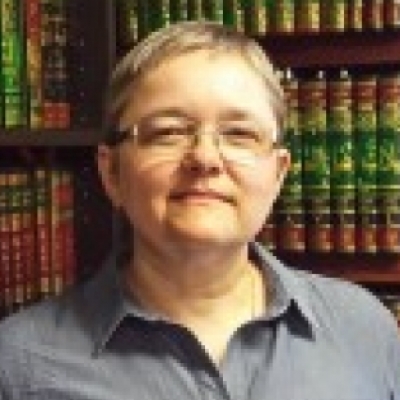



 Aisha Geissinger
Aisha Geissinger‘Gay-positive’ education is on the minds of many Toronto Muslim parents these days. While the province’s Conservative government claims to be bringing in a back-to-basics curriculum, and Toronto schools claim that their resources are being stretched to the limit by the provision of ESL (English as a second language) classes, time and money can still be found to inform the students that they can choose to be homosexuals!
The Toronto School Board pays social workers to go to schools and hold workshops on gay and lesbian issues. Parents charge that permission-forms or notices about these workshops vaguely describe them as promoting ‘equity and tolerance’ to ensure that people do not know what they are allowing their children to take part in. In May of this year, students from some Toronto schools brought permission-forms home informing their parents of the title of a play which they were to see, with the fact that the play was about homosexuality left unmentioned. Many Muslim parents were furious and the school board found it necessary to meet with them and promise that in future notices would be more specific.
Groups advocating homosexual rights have been openly active in Canada for several decades, but most Muslims have taken little notice of them. The effort needed to build and maintain mosques and establish charities tends to turn Muslims’ attention inwards, away from modern social trends that seem not to have immediate social relevance to us. As a result, little attention has been paid to the gay movement, except for a few pamphlets and sermons that inform Muslims that homosexuality is haraam, without addressing the question of how to deal with the challenges posed by the increasingly ‘gay-positive’ environment.
In the last few decades, the ‘image’ of homosexuals has changed radically for many North Americans. Visions of God’s destruction of Sodom and Gomorrah, of promiscuity and child-molestation, are giving way to other associations: ‘freedom to choose’, and inclusiveness, symbolised by the movement’s rainbow flag. Reluctance to discuss homosexuality openly is now seen as prudery. Aside from image-changes, politicians and big businessmen in Toronto admit frankly that they have discovered the political and economic importance of the ‘gay community’. The Canadian Charter of Rights and Freedoms and the human-rights codes of some provinces now prohibit discrimination on the basis of sexual orientation.
Gay-rights activists are also succeeding in taking the acceptance of homosexuality in the Charter a step further. As the law prohibits discrimination on the basis of sexual orientation, they argue, homosexuality must be treated as normal behaviour. Institutions or individuals failing to do so can find themselves taken to court. In 1993, for instance, the Toronto Area Gay and Lesbians Organisation bought advertising-space on Toronto bus-transfers. When the bus-company commissioners voted against allowing the advertisements to appear, the group brought a complaint before the Ontario Human Rights Commission. A settlement was finally reached earlier this year, and many Toronto bus-riders were shocked to find “Gay Services, look in the Business White Pages” on their transfers on the first weekend in June. In 1998, conservative Christian mayors in several towns were compelled to proclaim “Gay Pride Day” at official celebrations, despite their protests that this violated their beliefs. Many institutions are falling into line with the gay-rights agenda. The Toronto Public Library now advertises its gay and lesbian collection of books, featuring “fiction, biography, health, parenting, religion, art, social science, magazines and books for children of gay and lesbian parents”!
Withholding permission for our Muslim children to take part in ‘gay-positive’ events cannot protect them from the promotion of homosexuality that increasingly surrounds them. In the name of equality, teachers are encouraged to include ‘gay-positive’ information when teaching every subject. Moreover, the school board’s working paper on religious accommodations for Muslims states in the section on sexual orientation that parents will not be informed about lessons discussing homosexuality if they deal with the anti-harassment policies. The board claims that, as the Shari’ah secures basic rights and safety for all, Muslims must obviously support the Ontario Human Rights Code’s anti-harassment policies. This puts Muslims in an awkward position.
The secular language of human rights discourse is seen as a dividing line between civilisation and barbarism. Muslims refusing to reduce the Shari’ah to the level of modern human-rights codes find themselves outside the pale, with all the open discrimination and hostility this invites. The situation of Muslim students has been slowly improving, with schools increasingly facilitating the performance of salat and refraining from scheduling examinations during the Eids. Nevertheless, the general environment is far from positive for Muslim students; Islam is usually mentioned in the curriculum in the context of problems such as the ‘Arab-Israel conflict’ or discrimination against women. The firm association between Muslims and problems is perpetuated by the board’s working paper, which defines Muslim needs as ‘accommodations’ calling for ‘exemptions’ that can, in the case of prayer, cause ‘interruptions’. Conflict about ‘gay rights’ is unlikely to improve the situation of Muslim students. However, lessons on ant-harassment policies are evidently intended to make sure that some version of the ‘gay-positive’ message gets through to all students, a goal that Muslims can hardly support.
Muslim students are now paying the price of their elders’ disregard of social issues. It is hoped that scholars and imams will show some leadership in dealing with this issue before it is too late.
Muslimedia: July 16-31, 1999
